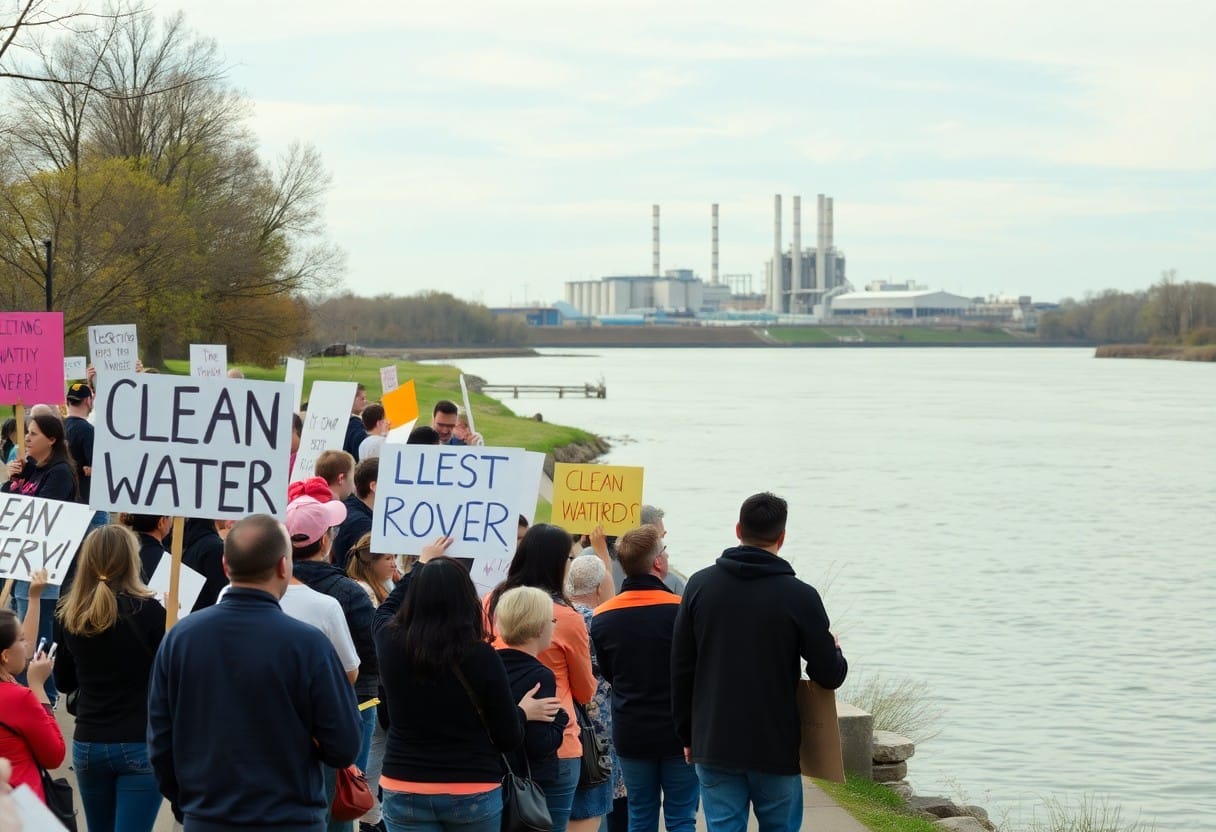It’s vital that you understand the serious implications of the water crisis facing Fayetteville, a situation largely linked to Chemours, a chemical manufacturing company. As you probe into this topic, you’ll discover the health risks associated with per- and polyfluoroalkyl substances (PFAS) contamination in the drinking water supply. You’ll also learn about the community’s response and the governmental measures taken to hold responsible parties accountable. This informative piece aims to provide clarity on who is truly behind this pressing environmental issue and what it means for you and your safety.
Background on Chemours
Company History
History is paramount when understanding the role of Chemours in the Fayetteville water crisis. Chemours was established in 2015 as a spin-off from the chemical giant DuPont, inheriting several of DuPont’s chemical manufacturing operations as well as its legacy concerns. With headquarters in Wilmington, Delaware, the company quickly became a significant player in the chemical industry, specializing in advanced materials, fluoroproducts, and titanium technologies. As you explore its background, you’ll find that Chemours has faced scrutiny over environmental and health implications tied to its products, particularly regarding the use of per- and polyfluoroalkyl substances (PFAS).
Product Overview
Around the globe, Chemours produces a wide array of products that serve various industries, including automotive, electronics, and consumer products. Its portfolio includes well-known brands such as Teflon and Zirconia, which are utilized in cookware and industrial applications. As you dig deeper, it becomes clear that while these products offer considerable benefits in terms of performance and durability, they are also linked to significant health and environmental concerns—particularly due to the toxic effects of PFAS that have been associated with water contamination incidents.
It is imperative to understand that while Chemours’ products may enhance your daily life through convenience and innovation, the persistent nature of PFAS compounds in the environment raises alarm. These substances do not degrade easily and can accumulate over time in the human body and ecosystems, leading to potential risks such as cancer, liver damage, and other serious health problems. The company has undertaken efforts to address these issues, yet the shadow of its past actions continues to loom large over communities like Fayetteville.
Overview of the Fayetteville Water Crisis
The Fayetteville water crisis has emerged as a significant environmental concern, primarily attributed to contamination from the Chemours chemical facility. This situation affects thousands of residents who rely on local water sources, raising alarm about the safety of drinking water. The Chemours responsible for New Hanover contamination unwittingly brings to light broader implications for public health and environmental safety, as well as the regulatory frameworks tasked with protecting these crucial resources. As you navigate this complex issue, understanding its history and implications is vital for grasping the magnitude of the crisis.
Timeline of Events
Across the years, a series of events have unfolded that paved the way for the current state of the Fayetteville water crisis. Starting with the initial reports of water contamination in 2017, the situation escalated as studies identified harmful levels of per- and polyfluoroalkyl substances (PFAS)—commonly referred to as “forever chemicals”—in local water supplies. Subsequent investigations revealed that the Chemours facility was the primary source of this contamination, leading to mounting pressure for accountability and remediation.
Impact on Communities
Timeline events have not only eroded trust in local water supplies but have also raised concerns regarding long-term health implications for affected communities. With ongoing research linking PFAS exposure to serious health issues—including cancer and liver damage—you must remain vigilant about your water safety. Residents now face a dilemma of whether to continue using existing water sources or invest in costly filtration systems to protect their families. Furthermore, the economic repercussions of this crisis can hinder local businesses and property values, underscoring how deeply intertwined your community’s health is with environmental stewardship.
With contaminated water presents significant risks, understanding the full scale of the implications allows you to engage in conversations about community safety and accountability. Awareness of the impact on health and the environment can be a driving force in demanding more stringent regulations and better practices from industries like Chemours. The future of Fayetteville’s water quality relies on proactive measures and a united front from its residents against corporate negligence.

Environmental Regulations and Compliance
One of the fundamental aspects of assessing the responsibility for the water crisis in Fayetteville revolves around the framework of environmental regulations and compliance. Adherence to these regulations can significantly dictate how companies like Chemours manage pollutants and safeguard community health. It’s important for you to understand that these regulations are not merely bureaucratic hurdles; they are designed to protect both human health and the environment, ensuring that substances harmful to water sources are monitored and controlled. When entities fall short in complying with these guidelines, repercussions can range from legal actions to significant health risks for the surrounding community.
Federal Guidelines
Environmental guidelines set at the federal level are important in controlling pollutants that can affect the waterways in communities such as Fayetteville. These guidelines establish baseline standards for safe drinking water and wastewater management, particularly focusing on toxic substances like per- and polyfluoroalkyl substances (PFAS). As a resident, you should be informed that the United States Environmental Protection Agency (EPA) has the authority to enforce these regulations, demanding compliance from companies whose activities might jeopardize water quality. It is crucial for you to keep an eye on these federal standards, as they form the backbone of a broader strategy to prevent water pollution and ensure safe drinking water for all.
State Regulations
Environmental regulations at the state level play a pivotal role in managing water quality, complementing the federal frameworks established by the EPA. In Fayetteville, state regulations are designed to address local concerns, ensuring that the specific environmental and health challenges faced by your community are met with tailored solutions. These regulations may involve stricter limits on potential contaminants or additional reporting requirements for companies like Chemours. By being aware of these state regulations, you empower yourself to hold responsible parties accountable for their actions and demand the necessary oversight to protect your water supply.
The state of North Carolina has enacted various environmental protection laws to mitigate risks associated with water contamination. These laws often involve more stringent testing requirements and enforcement mechanisms compared to federal standards. You can take part in advocating for stronger transparency and compliance measures, ensuring that water quality monitoring is prioritized, and that local industries are kept in check. Being informed about these regulations can empower you to participate in dialogues that aim to enhance water safety and hold companies accountable for their environmental footprint.
Assessment of Pollutants
Not every pollutant presents the same level of risk, but understanding the different substances contaminating the water supply is imperative for making informed decisions about your health and safety. In the Fayetteville area, PFOA and PFOS have been identified as significant issues, largely due to their association with industrial processes from Chemours. These per- and polyfluoroalkyl substances (PFAS) are known for their persistence in the environment and the human body, which means they do not easily break down over time. This accumulation can lead to adverse health outcomes in exposed individuals, raising concerns among local communities.
Chemical Analysis
Analysis of the water supply in Fayetteville reveals alarming concentrations of these contaminants, with levels well above recommended health guidelines. To give you a clearer picture, various studies and tests have indicated that the presence of these chemicals can lead to systemic effects on your health. Regular monitoring and chemical analysis of water samples can help gauge the extent of the pollution; however, the inconsistent approaches to testing may leave you with more questions than answers.
Health Implications
Assessment of the potential health implications associated with exposure to contaminants such as PFOA and PFOS is vital for understanding the risks you may face. Long-term exposure to these substances has been linked to serious health conditions, including kidney and testicular cancer, liver damage, and immune system effects. These findings can understandably evoke concern, particularly among vulnerable populations such as children and pregnant women who are more susceptible to the deleterious effects of chemical exposure.
And it’s worth noting that your level of exposure plays a significant role in determining the actual risk to your health. While the contaminants can be both ubiquitous and harmful, the positive news is that steps are being taken on various fronts to address this issue. Increased regulation, better filtration systems, and community awareness initiatives can help mitigate risks. Being informed about the specific pollutants in your water supply can empower you to take proactive measures to safeguard your health and that of your loved ones.
Legal Implications
All aspects of the water crisis in Fayetteville, particularly those tied to Chemours, involve a complex web of legal considerations. The regulatory framework governing industrial discharges is both intricate and stringent. Your concerns regarding water quality and safety have prompted legal actions that aim to hold Chemours accountable for the contamination that has directly impacted your community. Chemours plans to expand its Fayetteville Works site, but hasn’t cleaned up existing contamination, raising additional questions about its responsibilities to mitigate past damages while pursuing future expansions.
Ongoing Lawsuits
At the center of the legal struggle are ongoing lawsuits filed by local residents and environmental organizations against Chemours. These cases focus on issues such as the presence of harmful chemicals in the water supply and the procedural clarity regarding Chemours’ environmental obligations. The outcome of these lawsuits could set significant legal precedents and may lead to stricter regulatory measures not only for Chemours but for similar industries across the nation.
Accountability Issues
Lawsuits against Chemours also expose broader accountability issues in the regulations governing chemical manufacturing and waste disposal. You may find that state and federal agencies have faced criticism for their oversight, which some community members feel has failed to adequately protect public health. The repercussions of these legal disputes emphasize the need for a more robust system that holds corporations to their environmental commitments, especially in light of the grave implications for community safety.
Ongoing discussions about accountability highlight the importance of transparency and enforcement in industrial operations. You should be aware that the legal ramifications extend beyond just financial restitution; they pose a vital opportunity for reforming practices that have put your environment at risk. The way these issues unfold could bring about new regulations ensuring corporations prioritize the health and safety of your community above profit.
Community Response and Activism
To address the water crisis in Fayetteville, *local residents and organizations have mobilized to create initiatives aimed at improving water safety and holding Chemours accountable for contamination*. Engaging in community discussions and educational workshops, these emphatic residents are committed to raising awareness about the risks associated with toxic chemicals in their drinking water. *You may be interested to know that community groups have also begun organizing regular clean-up events and collaborating with environmental organizations to monitor water quality, which empowers residents to take charge of their public health*.
Local Initiatives
Above all, the collective efforts of citizens have led to the establishment of various initiatives that not only strive to clean up the contaminated water sources but also educate you on the importance of safe drinking water. *Local farmers and schools have initiated programs focused on sustainable practices and alternative water sourcing options*. These initiatives can serve as a model for other communities facing similar challenges, proving that grassroots action can herald significant change in your environment and health.
Advocacy Efforts
Community activists have taken it upon themselves to advocate strongly for comprehensive policies that address the contamination caused by Chemours. *They work tirelessly to engage local and state officials, pushing for legislative changes that demand accountability and protective measures for affected residents*. Encouraged by a sense of urgency, citizens are writing letters, organizing rallies, and using social media platforms to amplify their voices and concerns, aiming to capture the attention of decision-makers.
For instance, *numerous organizations have partnered with legal teams to initiate lawsuits* against Chemours, fighting for justice on behalf of those whose health and well-being have been compromised. *These advocacy efforts highlight the alarming levels of per- and polyfluoroalkyl substances (PFAS) found in your drinking water*, which have been linked to serious health effects. By joining these collective efforts, you can contribute to a more informed and engaged community that relentlessly seeks accountability from corporations, ensuring that such tragedies do not recur in the future.
To wrap up
Summing up, you can see that the water crisis in Fayetteville is a complex issue involving multiple stakeholders, primarily Chemours and local government entities. The discharge of per- and polyfluoroalkyl substances (PFAS) from Chemours’ facility has raised significant concerns about water safety, and as a resident or concerned citizen, it’s not just your health that’s at stake but also the integrity of the local ecosystem. Understanding the nuances of corporate responsibility and regulatory oversight is vital for you to grasp who should be held accountable.
Moreover, your role in advocating for transparency and accountability cannot be understated. Engaging with local authorities, participating in community discussions, and staying informed about ongoing developments can empower you to demand better practices and policies that protect your water supply. By taking an active interest in this issue, you contribute to a collective push for solutions that prioritize both public health and environmental sustainability in Fayetteville.


















